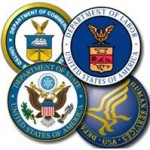Widgetized Section
Go to Admin » Appearance » Widgets » and move Gabfire Widget: Social into that MastheadOverlay zone
Thinking About the New Year
The views expressed are those of the author and do not necessarily reflect the views of ASPA as an organization.
By Anna Marie Schuh
January 15, 2016
In his 1887 essay “The Study of Administration,” Woodrow Wilson argued that politics could be separated from administration and the role of public administrators is only to implement policy. The debate over Wilson’s perspective continues. However, what is not in debate is that politics affects public administration. The wise public administrator observes political happenings in order to anticipate the change these happenings might bring.
 The beginning of the New Year is a good time to assess how current political events might affect the coming year in public administration and 2016 brings a major political event: a presidential election. Using candidate information and current events, this column examines how the upcoming election could affect public administration undertakings in three areas: anti-terrorism, budget constraints and response to citizen activism.
The beginning of the New Year is a good time to assess how current political events might affect the coming year in public administration and 2016 brings a major political event: a presidential election. Using candidate information and current events, this column examines how the upcoming election could affect public administration undertakings in three areas: anti-terrorism, budget constraints and response to citizen activism.
Recent events in Paris and San Bernardino, Calif., have thrust terrorism again to the forefront. The presidential candidates have responded with many suggestions that could affect public administrators. Republican presidential candidate Donald Trump’s ideas range from training rebels and creating a Syrian safe zone, to maintaining a database on Muslim’s and banning their travel to the U.S. Democratic presidential candidate Hillary Clinton’s proposals include defeating ISIS through increased airstrikes and supporting regional ground troops in Syria, to banning “no fly list” individuals from purchasing guns.
The above proposals touch many agencies. Obviously the defense and surveillance agencies need to be prepared for increasing and perhaps altering their programs. However, other agencies are likely to be affected. Homeland Security has responsibility for gun control and immigration issues. The State Department determines who is eligible to visit the U.S. The Treasury Department deals with terrorism through its work in financial intelligence. The Justice Department combats potential terrorism activities through monitoring anti-government groups and working with state and local police. Finally, the Federal Aviation Administration, within the Department of Transportation, will likely need to rethink some of their procedures.
Although the economy has been slowly improving and the budget deficit has been shrinking, altering policy involves costs and candidate positions on the economy inform the likelihood of effective policymaking. Candidate Trump’s economic proposals include tariffs on goods from China and Mexico, retaining the minimum wage at the current level, getting Wall Street pros more involved in the economy, repealing the Affordable Care Act and cutting taxes through eliminating loopholes. Candidate Clinton’s economic proposals include more oversight of the banking industry and ending corporate inversions, as well as increasing the minimum wage, reducing middle class taxes and raising the capital gains tax.
 Clearly these proposals affect the Treasury Department. However, they also have implications for the Department of Commerce, which deals with international trade; the Department of Health and Human Services, which is responsible for the Affordable Care Act; and the Securities and Exchange Commission, which monitors investment companies and investment banking.
Clearly these proposals affect the Treasury Department. However, they also have implications for the Department of Commerce, which deals with international trade; the Department of Health and Human Services, which is responsible for the Affordable Care Act; and the Securities and Exchange Commission, which monitors investment companies and investment banking.
More significantly, both budget increases and decreases affect all agencies. Even an overall budget at the same level, is not “business as usual” because a same level budget with some inflation means less buying power. In addition, same level budgets often involve moving money from less favored programs to more favored programs resulting in winners and losers.
The final political situation that is likely to affect both the election and future government policies is increased activism on social issues. Movements like the 2011 Occupy Wall Street live-ins, the 2014 minimum wage protests, the 2015 Black Lives Matter demonstrations and the recurring immigration protests in 2010, 2012 and 2014 are pressures on the political debate and the candidates typically respond with proposals. From a general perspective, Candidate Trump currently takes the conservative perspective refusing to increase the minimum wage, proposing closed immigration policies, getting Wall Street more involved in the economy and calling the Black Lives Matter movement a problem in political correctness. Candidate Clinton’s issues on these same movements are liberal, e.g., proposing an increased minimum wage, supporting the purpose of the Black Lives Matter movement, promoting financial oversight of Wall Street activities and advocating immigration reform with a path to citizenship,
The opposing views of the two candidates affect many agencies. The Department of Labor deals with minimum wage. The Equal Employment Opportunity Commission handles employment discrimination. The Justice, Homeland Security and State departments all have pieces of immigration policy. Finally, the Treasury Department and the Securities and Exchange Commission are just two of the organizations that address Wall Street practices.
No one knows whether either of the above candidates will ever become president. Still, both candidates offer policies that the next president will consider. The policy choices of the new president will affect public administrators at the federal, state and local levels. So it is important that government leaders at all levels consider the possibilities and prepare for potential program changes. Awareness is the first step in managing that change.
Author: Anna Marie Schuh is currently an associate professor and MPA program director at Roosevelt University in Chicago where she teaches political science and public administration. She retired from the federal government after 36 years. Her last assignment involved management of the Office of Personnel Management’s national oversight program.






 (3 votes, average: 4.00 out of 5)
(3 votes, average: 4.00 out of 5)
Gerardo Ramirez
January 15, 2016 at 10:19 pm
A great article that summarizes in detail how and when politics will affect Public Administration every step of the way. How agencies and department will react and handle several issues when they present itself, but more of all how will they implement the candidates agenda. This article I believe also raises another question when the new administration or president is swear in, the type of leadership in each agency or department heads that goes along or are more aligned with the presidents ideology.